|
|
|
Sort Order |
|
|
|
Items / Page
|
|
|
|
|
|
|
| Srl | Item |
| 1 |
ID:
168833
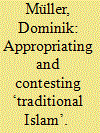

|
|
|
|
|
| Summary/Abstract |
Based on an ethnographic case study of an Islamic university in Russia, I examine how the state-implemented and bureaucratized traditionalization of Islam in Russia affects the everyday life of Central Asian students and how this project ‘from above’ is entangled with their coping strategies. I show how religious education has become a resource for the state as well as for young students and their parents. The Russian state uses these official religious institutions to control the Muslim population by creating and promoting a state-approved version of ‘traditional Islam’ and producing official religious specialists. For the young Muslim students, however, Islamic education provides, in addition to religious knowledge, access to networks, social security and new economic opportunities. It thereby offers a way to cope with the uncertainty caused by high unemployment rates and other socio-economic difficulties among young people.
|
|
|
|
|
|
|
|
|
|
|
|
|
|
|
|
| 2 |
ID:
129007
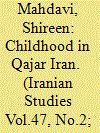

|
|
|
|
|
| Publication |
2014.
|
| Summary/Abstract |
The history of children in general and that of Persian children in particular is that of the inarticulate. The social history of Iran is a neglected field although in recent decades a preponderance of material has appeared on the history of women. Aside from this no work has been undertaken on the private life of the period including childhood and family life. This article examines various aspects of the position and upbringing of children in Qajar Iran ranging from the rearing of children to their status in the family, discipline, amusements and education. This investigation attempts to cover the childhood of different sexes and social classes both in rural and urban areas. The discussion is limited to Shi'i children, the majority population of Iran.
|
|
|
|
|
|
|
|
|
|
|
|
|
|
|
|
| 3 |
ID:
135004


|
|
|
|
|
| Summary/Abstract |
This article adds to the literature explaining a rise in the levels of violence and intimidation against the Islamic sect Ahmadiyah in Indonesia. In contrast to approaches that stop at describing the actors or doctrinal differences involved, this article situates the anti-Ahmadiyah discourse in wider processes of maintaining or securing political and social authority. The author first describes how charges of heresy have historically served to consolidate state and political authorities. This analysis is then extended into the post-Soeharto landscape by showing how the charges of heresy against Ahmadiyah have supported fragments of the New Order state to claw back some of the authority lost after the 1998 political transition. Finally, the author situates this process in the context of increased competition among religious authorities. The implications of using such an approach are twofold: first, the Indonesian state's role in the conflict is not defined only by its absence but also by its active involvement; and second, understanding the rise of conservative ulama as part of a wider process of an increase in many different voices weakens the claim that Indonesia is becoming more religiously conservative. The more general conclusion is that the role of academic writing should be to contextualize contemporary discourses of heresy by revisiting some of the methods used in classic heresiology.
|
|
|
|
|
|
|
|
|
|
|
|
|
|
|
|
| 4 |
ID:
159370


|
|
|
|
|
| Summary/Abstract |
This article considers the use of emoticons on transnational, English-language Islamic website forums as a case study to examine the shifts in Sunni religious authority, which have accelerated and deepened in the era of computation and new media. It shows the ways in which ordinary Muslims on conservative web forums invoke, deploy, and respond to different kinds of authority, from jurists to site administrators. It focuses first on particular websites’ endorsement of certain emoticons as Islamic (a smiley face with a hijab, e.g.), and then turns to forum users’ debates about emoticon usage. These debates range from questioning the acceptability of figural emoticons to the appropriateness of ‘secular’ emoticons on self-identified Islamic websites. It finds that while users often cite or request fatawa on emoticon usage when disputing with others, they are equally likely to post what they consider relevant hadith, appeal to common sense, or appeal to site administrators. This ground-up approach to engaging with the issue of emoticons gives nuance to what some scholars have termed the “crisis of authority” in Sunni Islam, and suggests that ordinary Muslims find authority in a diverse, sometimes contentious spectrum of locations. Far from being irrelevant to scholarship on contemporary Islam, emoticons are an important locus for understanding how pious Muslims have negotiated interactions in online spaces.
|
|
|
|
|
|
|
|
|
|
|
|
|
|
|
|
| 5 |
ID:
098223
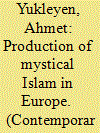

|
|
|
| 6 |
ID:
127780
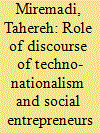

|
|
|
|
|
| Publication |
2014.
|
| Summary/Abstract |
This paper discusses the role of social entrepreneurship and the discourse of techno-nationalism in defining national selfhood in contemporary Iran. To examine the issue, this paper develops an in-depth case study of the development of stem cell research, and shows how an alliance between the leaders of the scientific community and Iran's politico-religious authority contributed to building technological capacity in the field of stem cell research in the first decade of the twenty-first century. The paper also highlights how the preliminary success of stem cell research, along with other knowledge-intensive technologies, has created a shared feeling of national pride and has served as the material base for the contemporary discourse of techno-nationalism. The paper concludes with the notion that the techno-nationalist discourse has the inherent potential to unwittingly help to redefine the dichotomy between Iran and the West in such a way that it becomes less antagonistic, should other factors permit.
|
|
|
|
|
|
|
|
|
|
|
|
|
|
|
|
| 7 |
ID:
134222
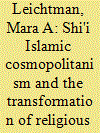

|
|
|
|
|
| Publication |
2014.
|
| Summary/Abstract |
Senegalese "conversion" to Shi'i Islam resulted from cosmopolitan interactions with West Africa's resident Lebanese population and Iranian revolutionary ideologies. Shi'i advocates spread their religious convictions through teaching, conferences, holiday celebrations, and media publicity. Key to their success are libraries full of Arabic and French texts from Iran and Lebanon. Inherent in Islamic education is the authority bestowed on those who are knowledgeable, and with the spread of religious knowledge through books, media, and the Internet comes a broadening of the scope of religious authority and resulting conflict with or accommodation of old political communities. Senegalese converts to Shi'i Islam use their literacy in Arabic and individually acquired libraries of Islamic legal books to bypass the authority of Sufi marabouts. Some keep their feet in both Sunni and Shi'i worlds, and their ability to compare religious texts of both traditions wins them disciples. Shi'i minorities claim autochthony and authenticity in Senegal through narrating revisionist historical accounts of the spread of (Shi'i) Islam to Africa. Conferences commemorating the martyrdom of Imam Husayn during the Shi'i mourning period in the month of Muharram target Sufi Muslims who also love the family of the Prophet. Shi'i leaders skillfully detach this foreign religious ideology from Middle Eastern politics and make this branch of Islam relevant to Senegalese through establishing religious centers as NGOs, which work to bring health care and economic development to neighborhoods in the name of Shi'i Islam.
|
|
|
|
|
|
|
|
|
|
|
|
|
|
|
|
| 8 |
ID:
129542
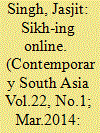

|
|
|
|
|
| Publication |
2014.
|
| Summary/Abstract |
Set in the context of a wider study of processes of religious transmission, this article examines the role of the Internet in the religious lives of young British Sikhs. Having explored the emergence of the presence of Sikhism online, data gathered through interviews, focus groups and a large scale online survey is analysed to understand how and why young British Sikhs use the Internet to learn about Sikhism and how the online environment may or may not impact on their ideas of religious tradition and authority. Using Campbell's [2007. "Who's Got the Power? Religious Authority and the Internet." Journal of Computer Mediated Communication 12 (3): 1043-1062] recommendation that any examination of the impact of the Internet on religious authority needs to be sufficiently contextualised, I argue that the effects of the online environment on traditional sources of religious authority are not as stark as scholars studying the early impact of the Internet suggest. Given that 'going online' has become an everyday practice for many young people living in Britain, this article contributes to understanding the online religious lives of young people in general, and young British Sikhs in particular.
|
|
|
|
|
|
|
|
|
|
|
|
|
|
|
|
| 9 |
ID:
175145
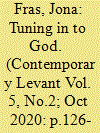

|
|
|
|
|
| Summary/Abstract |
Sound and spoken language play a major role in contemporary Islamic media. On Islamic advice programmes in Jordan, a genre of radio show in which listeners call in to the station with questions regarding pious Sunni Muslim conduct, broadcasters use language in ways that conveys authority to the Islamic textual tradition, and therefore presents their responses as legitimate advice for pious Muslims. By manipulating the language of quotations, broadcasters both ‘entextualise’ segments of language and develop dialogical relationships with Islamic texts – principally, the Qur’an and hadith literature – as well as the audiences addressed and co-present callers. Though the programmes provide a forum for public discussion of religious issues, a linguistic anthropological analysis nevertheless reveals the persistent asymmetry and exclusion inherent in this type of mediated interaction: hosts remain supremely authoritative dispensers of advice to lay callers, and the programme’s listenership is idealised as a pious Jordanian Sunni Muslim audience from which non-devout individuals are excluded. Details of communicative interaction must, therefore, be given careful attention when examining the role of religious media in the contemporary Middle East.
|
|
|
|
|
|
|
|
|
|
|
|
|
|
|
|
| 10 |
ID:
129006
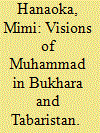

|
|
|
|
|
| Publication |
2014.
|
| Summary/Abstract |
Persian authors couched claims to the religio-political authority and legitimacy of their cities through dream narratives in local histories written between the tenth and thirteenth centuries. Persians did not always fit neatly into genealogical claims to legitimacy like the Arab descendants of Mu?ammad and his clan, and dreams form alternate avenues that sanctify and legitimate specific Persian cities and individuals. Dream narratives embedded in T?r?kh-i Bukh?r? and T?r?kh-i ?abarist?n are literary devices that bring the prestige of religious authority to their city and province and to specific persons. These dream narratives are not only windows into understanding the broader social, political, and religious contexts of local histories but also the particular anxieties and priorities of the authors.
|
|
|
|
|
|
|
|
|
|
|
|
|
|
|
|
|
|
|
|
|